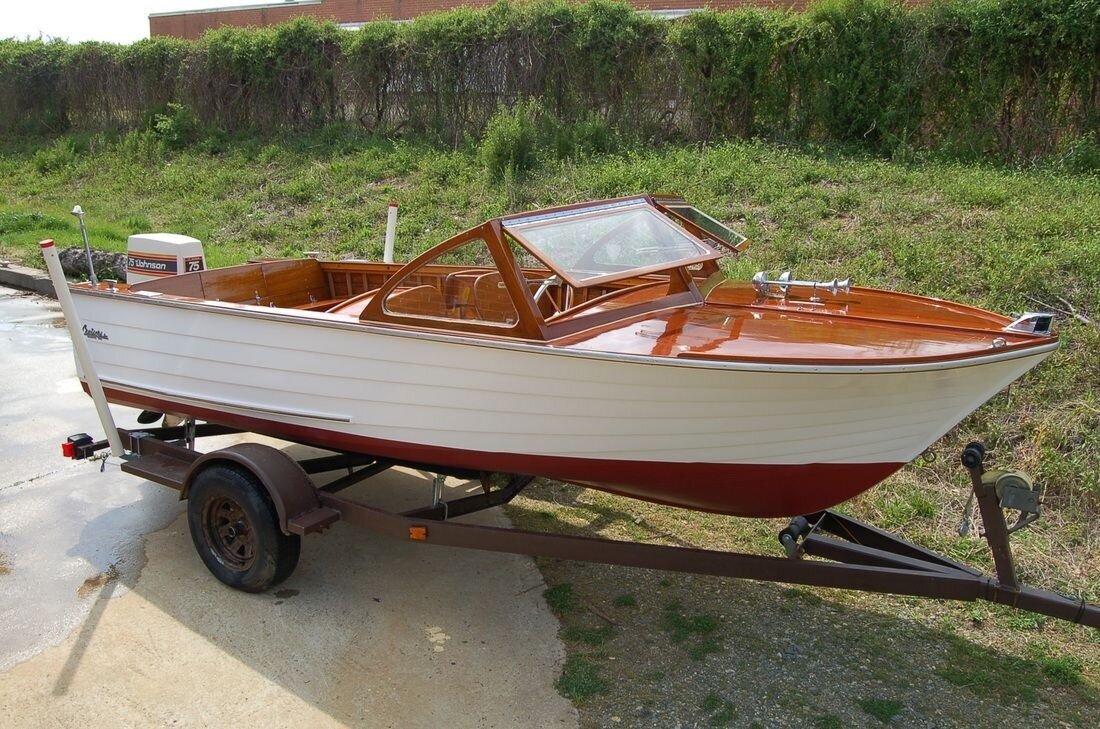That Feeling on the Boat
This isn’t actually the boat. But as far as I remember, it’s exactly what it looked like.
My grandfather on my mom’s side died before we were born—suddenly—and of a condition that might have been managed had he known about it. The story in our family is that his death is the reason we’re all alive, my brother, my sister, and me. Our parents weren’t planning on having kids: We would be something for our grandmother to do, to grow, to love. And we were. She picked us up every day from school, took care of us, loved us to pieces, taught us her phrases—where there’s a will there’s a way, you learn something new every day, not can’t but will—and showed us how to notice the small things. Mary Oliver’s The Bleeding Heart reminds me of her every time I read it, and I smile any time it comes to mind.
My grandfather, Dan was his name, used it to fish. In their tiny two car garage, over in the left port, always sat a wooden motor boat. He was a union guy and a factory worker and a craftsman and a tinkerer. My dad told me that he learned how to be a good man from Dan. When we were really young, we’d all go out on this boat—crammed together and practically sinking the thing—my parents and the three kids. We’d fly down the Niagara river and across Lake Erie, the water splashing up into the boat, our bodies jumping up and down with the break of the waves. I have always loved to go fast, and we went fast. I have always loved water, feeling the boundaries of self slip away floating along in a giant body that covers the world. On this boat, the water owned us. In the water, I feel free.
When it was time to clean out my gramma’s house, I asked my parents if I could come get the boat and trail it the 3,000 miles from the tiny garage on Hamilton Blvd in Kenmore NY to a tiny driveway on N. Hodge in Portland, OR. No one had used it in 25 years, probably, and I wanted to float around on it on the Columbia. It felt powerful to me, the connection of keeping this body memory of the boat and water and thrill and my grandfather I never met but whose death meant we were alive, alive.
“It felt powerful to me, the connection of keeping this body memory of the boat and water and thrill and my grandfather I never met but whose death meant we were alive, alive.”
One day, out of the blue, I opened the mail and there it was: A check for a couple thousand dollars with a note that read “boat”. I can’t remember if it was $1,200 or $2,000, I just remember that I knew right away that a future had to flow from that boat. I spent the next month picking out a ring so that Rachel and I could get married. On July 30, 2016, we celebrated in Leland, Michigan, right on the N. Lake Leelanau, with friends and family and the ring my grandfather’s boat brought to us. As our relationship has changed over this last year, I’ve been trying to make sense of what I committed to, who I was on that day, who I am through transformation, who Rachel and I are to each other. We are coparents to Willa. We are dear to each other. We are people who have ten years of inside jokes and ways of communicating and memories and family creating and navigating and joy and trauma. The enormity of how life changes, even when we need it to, can be as overwhelming as it is beautiful. I am, and maybe we both are, as happy as I am heartbroken.
A couple weeks ago, I started working with a new therapist. She asked me: How is it that you are married? How is it that you decided to get married? So I told her the story, the one you just read. I had never told it before then, or even thought to share it, really. In the last few minutes of our session, her eyes lit up. Without missing a beat, she said: Dearest one, that’s what you married. You married a life of unboundaried momentum. You and Rachel together are a part of your constellation and always will be. You married that feeling in the water. You married that feeling on the boat.
